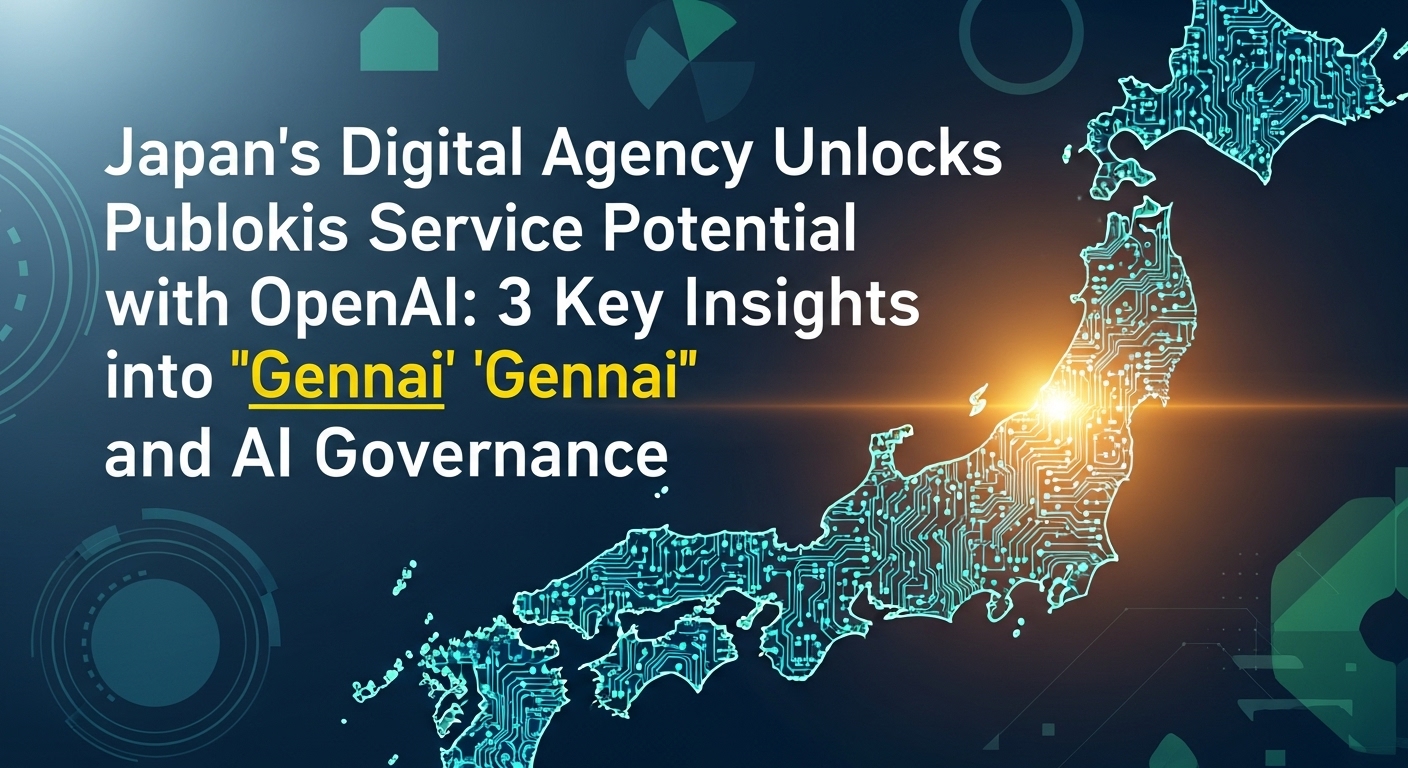デジタル庁、OpenAIと戦略的連携!「ガバメントAI」が拓く行政DXの最前線
日本の行政DXを推進するデジタル庁が、生成AIの最先端企業であるOpenAIとの戦略的連携を発表しました。これは、デジタル庁職員が利用する生成AI環境「源内」にOpenAIの最新大規模言語モデル(LLM)を活用したサービスを追加し、行政業務の効率化と公務員の働き方改革を大きく前進させる画期的な取り組みです。今回の連携は、単なるツール導入に留まらず、「ガバメントAI」の具体化に向けた重要な一歩となります。
「源内」とは?行政DXを加速する生成AI環境
デジタル庁は2025年5月より、全職員が利用できる生成AI環境「源内(げんない)」を内製開発し、運用を開始しています。これまではAWSのNova Lite、AnthropicのClaude 3 Haiku、Claude 3.5 SonnetといったLLMを活用してきました。 「源内」は、チャット、文章作成、要約、校正、翻訳といった汎用的な機能に加え、以下のような行政実務に特化した20種類以上のAIアプリケーションを提供しています。
- Lawsy(法制度調査支援AI)
- 国会答弁検索AI
- 公用文チェッカーAI
2025年5月から7月の3か月間では、全職員約1,200人のうち約8割にあたる950人が「源内」を利用し、延べ6万5,000回以上の実行が行われました。職員一人当たりの平均利用回数は70回に上り、業務効率化に「寄与している」と約8割の職員が回答するなど、その効果は高く評価されています。
OpenAI連携で変わる行政サービス
今回のOpenAIとの連携により、「源内」の既存のラインナップにOpenAIの最新LLMが加わります。これにより、さらなる高精度な文章生成、複雑な問い合わせ対応、データ分析支援などが可能となり、行政業務の質の向上と効率化が期待されます。 デジタル庁とOpenAIは、以下のような分野で具体的な協力の可能性を検討しています。
- 行政機関向けの生成AIアプリケーションの共同開発
- 利用実証を通じた業務効率化の推進
- 公務員の働き方改革に向けたAI活用モデルの検討
特に、文書作成や申請処理といった定型業務に生成AIを導入することで、作業時間の削減や質の均一化が進み、国民へのサービス提供スピードの向上にもつながるでしょう。
信頼と安全を追求:ISMAP認証と「広島AIプロセス」
AIを行政サービスに導入する上で、セキュリティと信頼性は最重要課題です。OpenAIは今回の連携にあたり、日本政府が定める情報システムセキュリティ評価制度「ISMAP認証」の取得を目指すことを表明しました。これは、政府システムにおける安全なクラウドサービス利用を保証するための重要なステップとなります。
さらに、デジタル庁とOpenAIは、安全・安心で信頼できる高度なAIシステムの普及を目的とした国際的政策枠組みである「広島AIプロセス包括的政策枠組み」を推進する方針を共有しています。G7を超えてアジア諸国や新興エコノミーを含む多様な主体への拡大を目指し、AIに関する包摂的な国際ガバナンスの形成を促進することで、世界中の人々が安全にAIを利用できる環境づくりに貢献します。
今後の展望と課題
「源内」は、デジタル庁内での実績を踏まえ、2026年1月以降に一部省庁での展開検証を開始し、同年度以降には希望する行政機関への本格展開を目指しています。 これにより、「ガバメントAI」構想が日本全国の行政機関へと波及し、デジタル社会の実現が加速することが期待されます。
一方で、生成AIの活用には、情報漏えいリスクや誤出力による行政判断の誤り、さらには職員間の利用格差といった課題も存在します。 デジタル庁は、これらの課題に対し、適切なセキュリティ対策、利用ガイドラインの整備、職員研修の強化などを通じて対応していく方針です。
今回のデジタル庁とOpenAIの連携は、日本の行政がAIを活用して国民サービスを劇的に向上させるための、歴史的な一歩と言えるでしょう。安全性を確保しつつ、最先端の技術を行政に導入することで、より効率的で、より信頼性の高い「ガバメントAI」の実現が期待されます。私たちは、この新たな取り組みがもたらす未来の行政の姿に注目していきます。
Japan’s Digital Agency Forges Ahead with OpenAI: Revolutionizing Public Services with ‘Gennai’
In a groundbreaking move set to redefine public administration, Japan’s Digital Agency has announced a strategic collaboration with OpenAI, integrating advanced Large Language Models (LLMs) into its generative AI environment dubbed “Gennai.” This partnership marks a significant leap towards realizing “Government AI,” promising enhanced efficiency in administrative tasks and a transformative shift in the work styles of civil servants across Japan.
Unveiling ‘Gennai’: A New Era for Civil Servants
At the heart of this collaboration lies “Gennai,” an innovative AI tool powered by OpenAI’s cutting-edge LLM technology, which will be made accessible to government employees. This initiative aims to explore how generative AI can be safely and effectively leveraged to improve public services. By providing civil servants with sophisticated AI capabilities, the Digital Agency intends to streamline complex processes, automate routine tasks, and facilitate quicker, more informed decision-making. OpenAI’s foundational models will be explored to develop specialized AI applications tailored for administrative duties. The deployment of these AI services for government employees is anticipated to begin as early as fiscal year 2026, with plans to encourage broader adoption across other government agencies.
Driving Efficiency and Empowering Work-Style Reform
The primary objectives of integrating OpenAI’s LLMs into Japan’s administrative framework are manifold. Firstly, the partnership is expected to significantly boost the efficiency of government operations. With Japan facing a serious shortage of workers due to an aging population and low birth rate, actively utilizing AI, including generative AI, has become inevitable for national and local governments to maintain and strengthen public services. The AI can assist with tasks such as generating responses to parliamentary inquiries, aiding legal research, and drafting various documents, thereby freeing up civil servants to focus on more complex and citizen-centric initiatives.
Secondly, this collaboration is poised to drive crucial work-style reforms for public sector employees. By automating mundane and time-consuming administrative burdens, civil servants can experience a noticeable improvement in their daily workflows. This not only enhances job satisfaction but also allows for a reallocation of human resources to areas requiring nuanced human judgment and direct public engagement, ultimately leading to more responsive and effective governance. The Digital Agency has already developed 20 types of specialized generative AI applications for administrative work, including the “Diet response search AI” and the “legal system research support AI,” and plans to collaborate with OpenAI on further developing such applications.
Japan’s Broader Vision: Global Leadership in AI Governance
This partnership with OpenAI is not an isolated effort but rather a strategic component of Japan’s overarching vision for digital transformation and responsible AI governance. The Digital Agency, established in 2021, acts as a control tower for the country’s digital initiatives, aiming to overcome past inefficiencies and drive modernization across government and society. Japan has taken a proactive stance in the international arena, leading the “Hiroshima AI Process,” which is the first comprehensive international policy framework to establish guidelines and codes of conduct for safe, secure, and trustworthy advanced AI systems.
A crucial aspect of the collaboration is OpenAI’s commitment to pursuing ISMAP (Information system Security Management and Assessment Program) certification, which verifies that cloud services meet the rigorous security standards required by the Japanese government. This commitment underscores the focus on ensuring the secure and reliable integration of AI into sensitive government systems. The Digital Agency has also released draft guidelines for central ministries and agencies on the safe and appropriate use of generative AI, encouraging its use where risks are low while properly regulating high-risk applications.
The Road Ahead: Challenges and Opportunities
While the potential benefits are immense, the road to fully realizing “Government AI” comes with its own set of challenges. Ensuring data privacy, mitigating algorithmic bias, and continuously updating AI models to reflect evolving societal needs will be paramount. However, the Digital Agency’s proactive approach to governance and its emphasis on safety and international cooperation, as seen through its engagement with the Hiroshima AI Process, lay a strong foundation for responsible deployment.
The collaboration is expected to serve as a catalyst for further technological advancements and encourage broader AI adoption across various government entities from fiscal year 2026. As “Gennai” evolves, it will not only transform the internal workings of Japan’s government but also offer valuable insights and models for other nations seeking to harness the power of AI for public good. Japan’s commitment to leading in this field, alongside efforts to develop domestic LLMs and accelerate AI capabilities, positions it as a key player in shaping the future of AI governance globally.



